Analysis of BBC's Business Environment: Stakeholders and Factors
VerifiedAdded on 2022/12/29
|9
|2261
|71
Report
AI Summary
This report provides a comprehensive analysis of the BBC's business environment, focusing on internal and external factors impacting its operations. The analysis includes a SWOT analysis, examining the corporation's strengths, weaknesses, opportunities, and threats, and a PESTLE analysis, evaluating the political, economic, social, technological, legal, and environmental factors influencing the BBC. The report also explores the requirements of various stakeholders, including customers, employees, and the government. The conclusion summarizes the findings, highlighting the BBC's ability to leverage opportunities and manage challenges within its environment. Recommendations are also provided to enhance the BBC's performance and address shortcomings. The report also includes references to supporting literature.
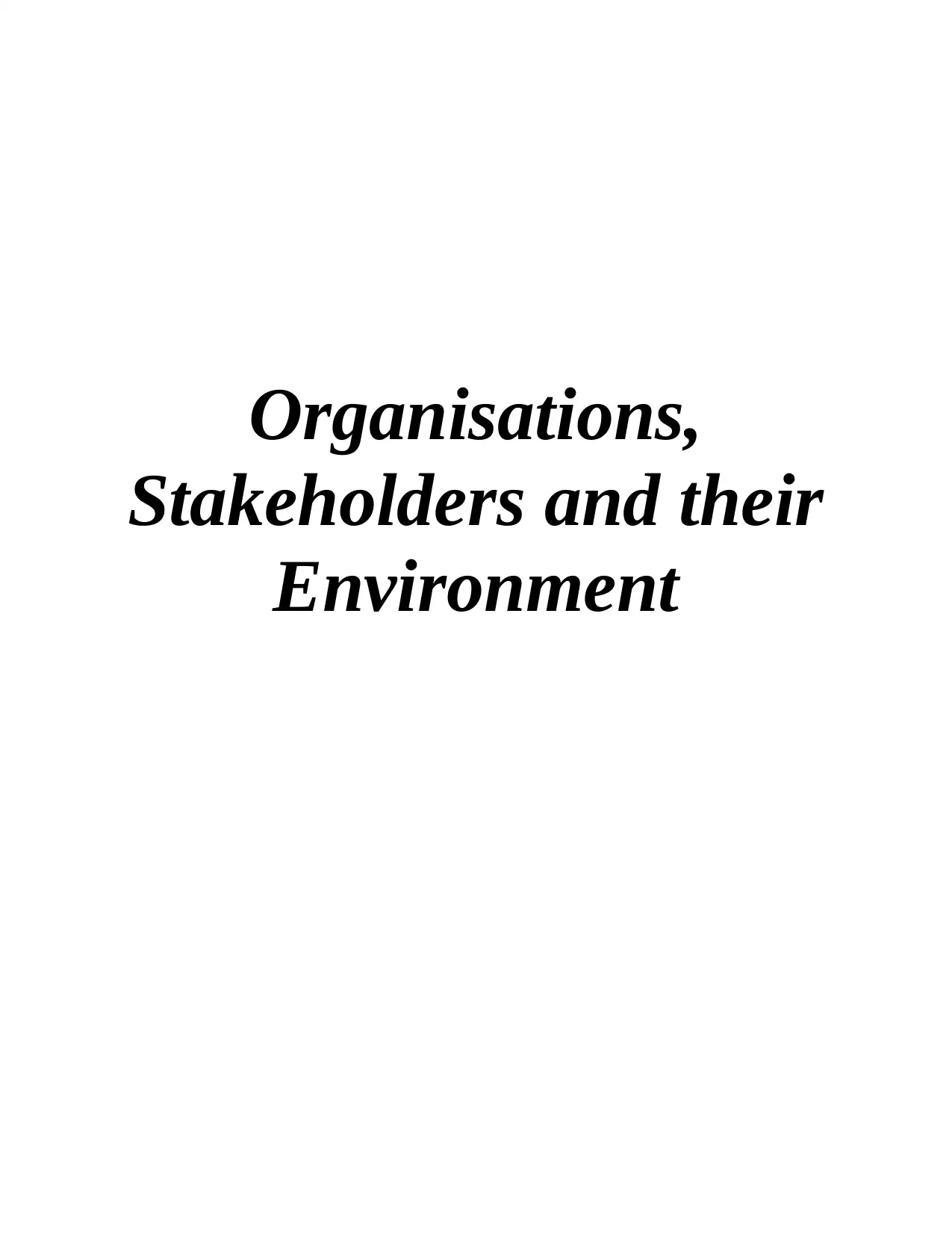
Organisations,
Stakeholders and their
Environment
Stakeholders and their
Environment
Paraphrase This Document
Need a fresh take? Get an instant paraphrase of this document with our AI Paraphraser
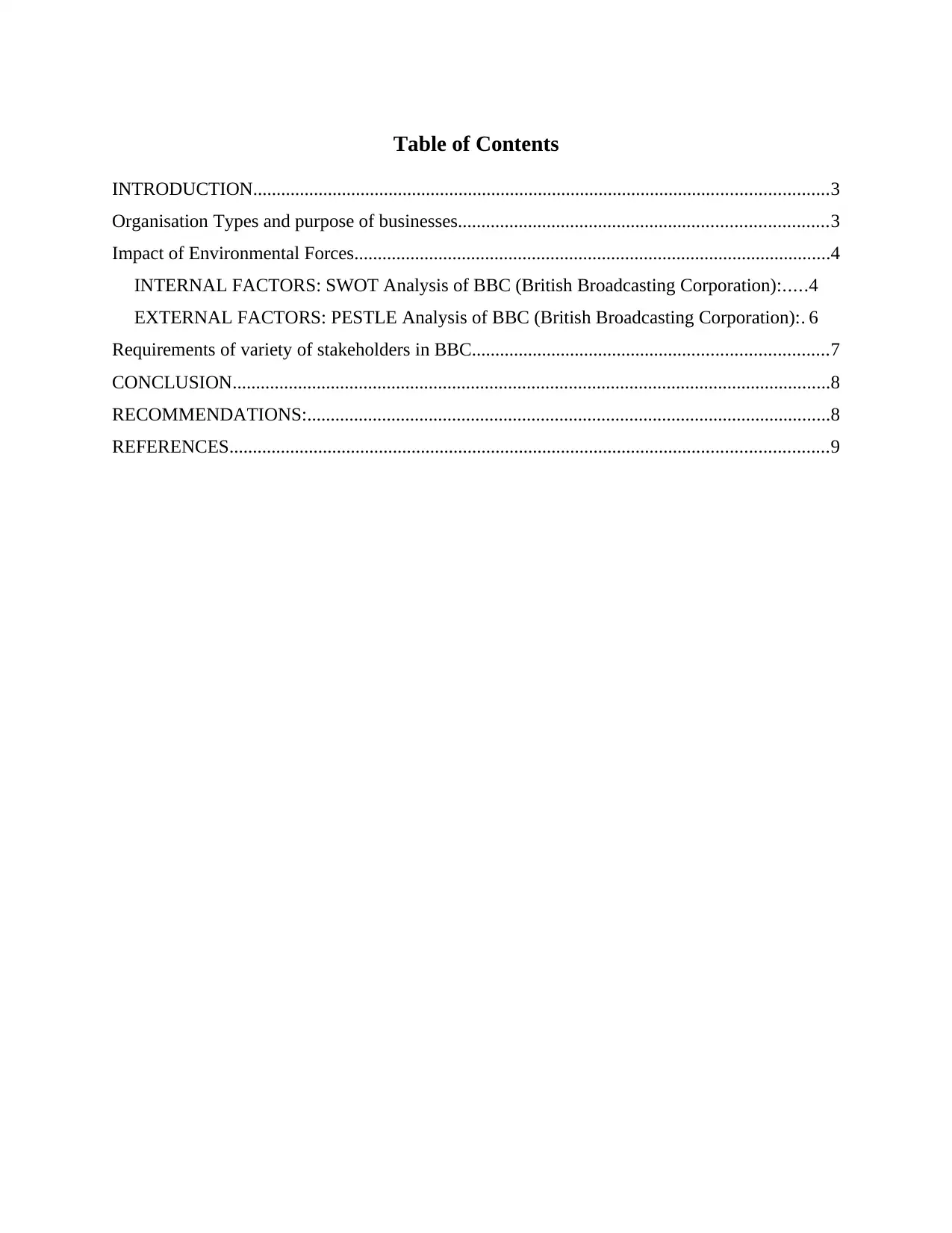
Table of Contents
INTRODUCTION...........................................................................................................................3
Organisation Types and purpose of businesses...............................................................................3
Impact of Environmental Forces......................................................................................................4
INTERNAL FACTORS: SWOT Analysis of BBC (British Broadcasting Corporation):.....4
EXTERNAL FACTORS: PESTLE Analysis of BBC (British Broadcasting Corporation):. 6
Requirements of variety of stakeholders in BBC............................................................................7
CONCLUSION................................................................................................................................8
RECOMMENDATIONS:................................................................................................................8
REFERENCES................................................................................................................................9
INTRODUCTION...........................................................................................................................3
Organisation Types and purpose of businesses...............................................................................3
Impact of Environmental Forces......................................................................................................4
INTERNAL FACTORS: SWOT Analysis of BBC (British Broadcasting Corporation):.....4
EXTERNAL FACTORS: PESTLE Analysis of BBC (British Broadcasting Corporation):. 6
Requirements of variety of stakeholders in BBC............................................................................7
CONCLUSION................................................................................................................................8
RECOMMENDATIONS:................................................................................................................8
REFERENCES................................................................................................................................9
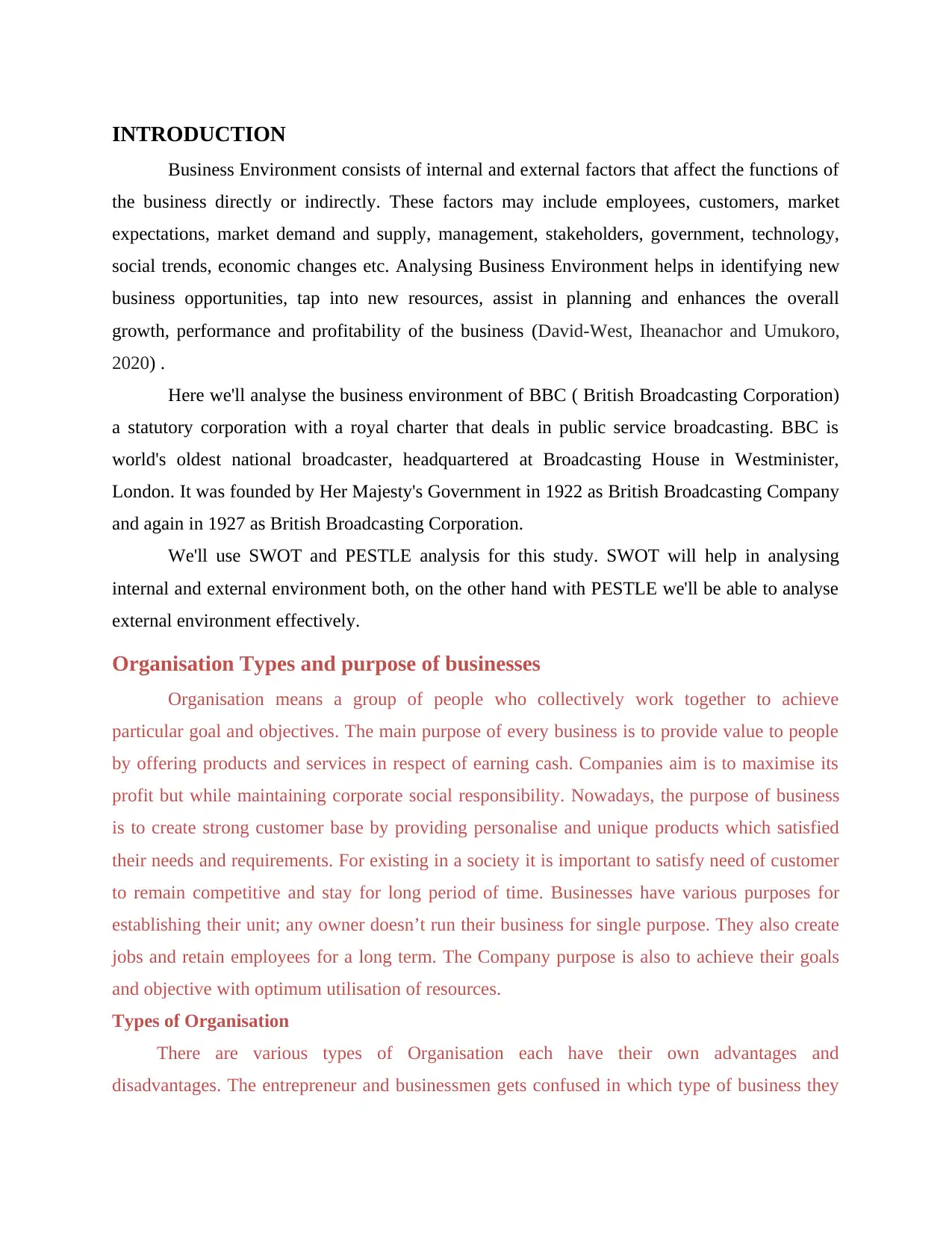
INTRODUCTION
Business Environment consists of internal and external factors that affect the functions of
the business directly or indirectly. These factors may include employees, customers, market
expectations, market demand and supply, management, stakeholders, government, technology,
social trends, economic changes etc. Analysing Business Environment helps in identifying new
business opportunities, tap into new resources, assist in planning and enhances the overall
growth, performance and profitability of the business (David-West, Iheanachor and Umukoro,
2020) .
Here we'll analyse the business environment of BBC ( British Broadcasting Corporation)
a statutory corporation with a royal charter that deals in public service broadcasting. BBC is
world's oldest national broadcaster, headquartered at Broadcasting House in Westminister,
London. It was founded by Her Majesty's Government in 1922 as British Broadcasting Company
and again in 1927 as British Broadcasting Corporation.
We'll use SWOT and PESTLE analysis for this study. SWOT will help in analysing
internal and external environment both, on the other hand with PESTLE we'll be able to analyse
external environment effectively.
Organisation Types and purpose of businesses
Organisation means a group of people who collectively work together to achieve
particular goal and objectives. The main purpose of every business is to provide value to people
by offering products and services in respect of earning cash. Companies aim is to maximise its
profit but while maintaining corporate social responsibility. Nowadays, the purpose of business
is to create strong customer base by providing personalise and unique products which satisfied
their needs and requirements. For existing in a society it is important to satisfy need of customer
to remain competitive and stay for long period of time. Businesses have various purposes for
establishing their unit; any owner doesn’t run their business for single purpose. They also create
jobs and retain employees for a long term. The Company purpose is also to achieve their goals
and objective with optimum utilisation of resources.
Types of Organisation
There are various types of Organisation each have their own advantages and
disadvantages. The entrepreneur and businessmen gets confused in which type of business they
Business Environment consists of internal and external factors that affect the functions of
the business directly or indirectly. These factors may include employees, customers, market
expectations, market demand and supply, management, stakeholders, government, technology,
social trends, economic changes etc. Analysing Business Environment helps in identifying new
business opportunities, tap into new resources, assist in planning and enhances the overall
growth, performance and profitability of the business (David-West, Iheanachor and Umukoro,
2020) .
Here we'll analyse the business environment of BBC ( British Broadcasting Corporation)
a statutory corporation with a royal charter that deals in public service broadcasting. BBC is
world's oldest national broadcaster, headquartered at Broadcasting House in Westminister,
London. It was founded by Her Majesty's Government in 1922 as British Broadcasting Company
and again in 1927 as British Broadcasting Corporation.
We'll use SWOT and PESTLE analysis for this study. SWOT will help in analysing
internal and external environment both, on the other hand with PESTLE we'll be able to analyse
external environment effectively.
Organisation Types and purpose of businesses
Organisation means a group of people who collectively work together to achieve
particular goal and objectives. The main purpose of every business is to provide value to people
by offering products and services in respect of earning cash. Companies aim is to maximise its
profit but while maintaining corporate social responsibility. Nowadays, the purpose of business
is to create strong customer base by providing personalise and unique products which satisfied
their needs and requirements. For existing in a society it is important to satisfy need of customer
to remain competitive and stay for long period of time. Businesses have various purposes for
establishing their unit; any owner doesn’t run their business for single purpose. They also create
jobs and retain employees for a long term. The Company purpose is also to achieve their goals
and objective with optimum utilisation of resources.
Types of Organisation
There are various types of Organisation each have their own advantages and
disadvantages. The entrepreneur and businessmen gets confused in which type of business they
⊘ This is a preview!⊘
Do you want full access?
Subscribe today to unlock all pages.

Trusted by 1+ million students worldwide
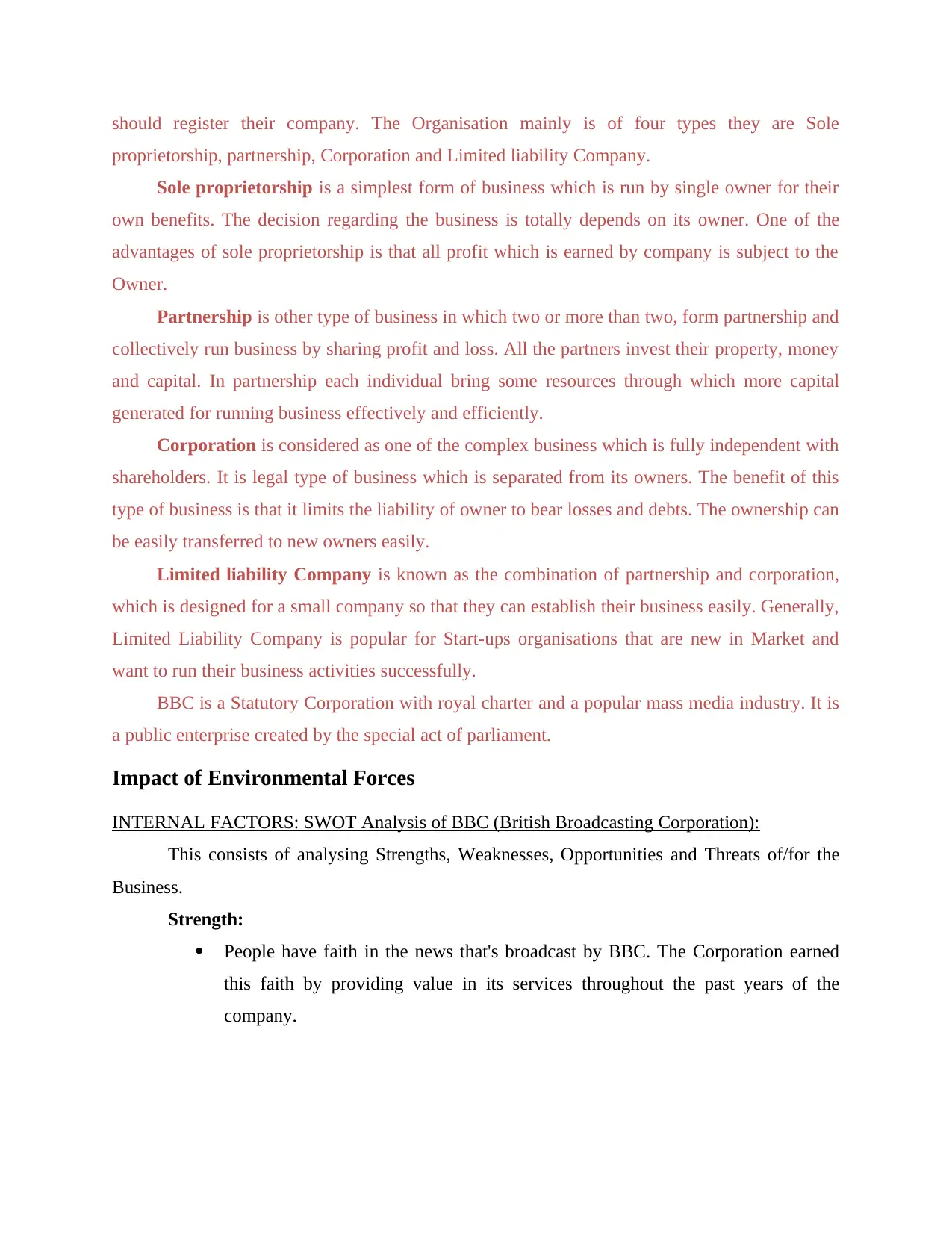
should register their company. The Organisation mainly is of four types they are Sole
proprietorship, partnership, Corporation and Limited liability Company.
Sole proprietorship is a simplest form of business which is run by single owner for their
own benefits. The decision regarding the business is totally depends on its owner. One of the
advantages of sole proprietorship is that all profit which is earned by company is subject to the
Owner.
Partnership is other type of business in which two or more than two, form partnership and
collectively run business by sharing profit and loss. All the partners invest their property, money
and capital. In partnership each individual bring some resources through which more capital
generated for running business effectively and efficiently.
Corporation is considered as one of the complex business which is fully independent with
shareholders. It is legal type of business which is separated from its owners. The benefit of this
type of business is that it limits the liability of owner to bear losses and debts. The ownership can
be easily transferred to new owners easily.
Limited liability Company is known as the combination of partnership and corporation,
which is designed for a small company so that they can establish their business easily. Generally,
Limited Liability Company is popular for Start-ups organisations that are new in Market and
want to run their business activities successfully.
BBC is a Statutory Corporation with royal charter and a popular mass media industry. It is
a public enterprise created by the special act of parliament.
Impact of Environmental Forces
INTERNAL FACTORS: SWOT Analysis of BBC (British Broadcasting Corporation):
This consists of analysing Strengths, Weaknesses, Opportunities and Threats of/for the
Business.
Strength:
People have faith in the news that's broadcast by BBC. The Corporation earned
this faith by providing value in its services throughout the past years of the
company.
proprietorship, partnership, Corporation and Limited liability Company.
Sole proprietorship is a simplest form of business which is run by single owner for their
own benefits. The decision regarding the business is totally depends on its owner. One of the
advantages of sole proprietorship is that all profit which is earned by company is subject to the
Owner.
Partnership is other type of business in which two or more than two, form partnership and
collectively run business by sharing profit and loss. All the partners invest their property, money
and capital. In partnership each individual bring some resources through which more capital
generated for running business effectively and efficiently.
Corporation is considered as one of the complex business which is fully independent with
shareholders. It is legal type of business which is separated from its owners. The benefit of this
type of business is that it limits the liability of owner to bear losses and debts. The ownership can
be easily transferred to new owners easily.
Limited liability Company is known as the combination of partnership and corporation,
which is designed for a small company so that they can establish their business easily. Generally,
Limited Liability Company is popular for Start-ups organisations that are new in Market and
want to run their business activities successfully.
BBC is a Statutory Corporation with royal charter and a popular mass media industry. It is
a public enterprise created by the special act of parliament.
Impact of Environmental Forces
INTERNAL FACTORS: SWOT Analysis of BBC (British Broadcasting Corporation):
This consists of analysing Strengths, Weaknesses, Opportunities and Threats of/for the
Business.
Strength:
People have faith in the news that's broadcast by BBC. The Corporation earned
this faith by providing value in its services throughout the past years of the
company.
Paraphrase This Document
Need a fresh take? Get an instant paraphrase of this document with our AI Paraphraser
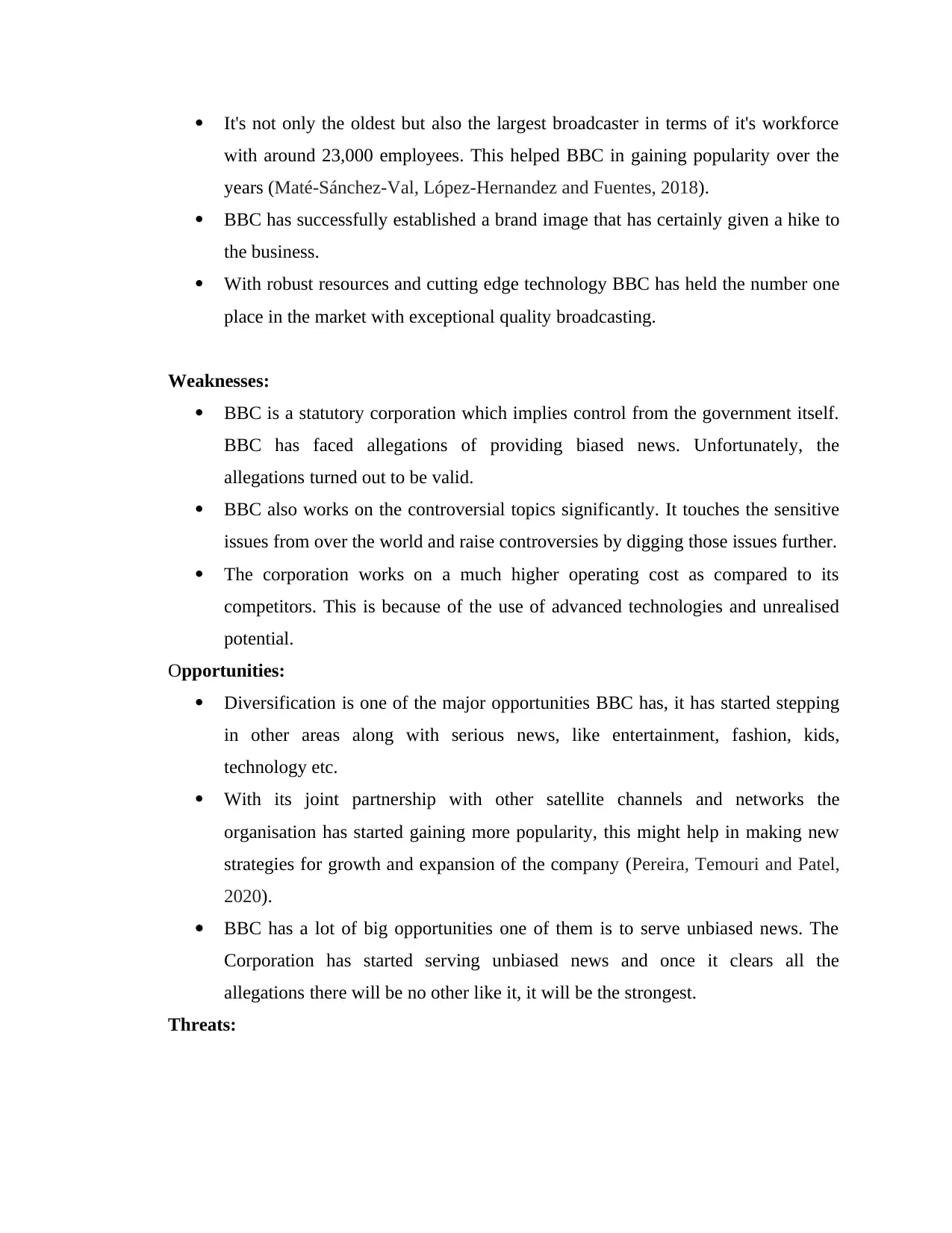
It's not only the oldest but also the largest broadcaster in terms of it's workforce
with around 23,000 employees. This helped BBC in gaining popularity over the
years (Maté-Sánchez-Val, López-Hernandez and Fuentes, 2018).
BBC has successfully established a brand image that has certainly given a hike to
the business.
With robust resources and cutting edge technology BBC has held the number one
place in the market with exceptional quality broadcasting.
Weaknesses:
BBC is a statutory corporation which implies control from the government itself.
BBC has faced allegations of providing biased news. Unfortunately, the
allegations turned out to be valid.
BBC also works on the controversial topics significantly. It touches the sensitive
issues from over the world and raise controversies by digging those issues further.
The corporation works on a much higher operating cost as compared to its
competitors. This is because of the use of advanced technologies and unrealised
potential.
Opportunities:
Diversification is one of the major opportunities BBC has, it has started stepping
in other areas along with serious news, like entertainment, fashion, kids,
technology etc.
With its joint partnership with other satellite channels and networks the
organisation has started gaining more popularity, this might help in making new
strategies for growth and expansion of the company (Pereira, Temouri and Patel,
2020).
BBC has a lot of big opportunities one of them is to serve unbiased news. The
Corporation has started serving unbiased news and once it clears all the
allegations there will be no other like it, it will be the strongest.
Threats:
with around 23,000 employees. This helped BBC in gaining popularity over the
years (Maté-Sánchez-Val, López-Hernandez and Fuentes, 2018).
BBC has successfully established a brand image that has certainly given a hike to
the business.
With robust resources and cutting edge technology BBC has held the number one
place in the market with exceptional quality broadcasting.
Weaknesses:
BBC is a statutory corporation which implies control from the government itself.
BBC has faced allegations of providing biased news. Unfortunately, the
allegations turned out to be valid.
BBC also works on the controversial topics significantly. It touches the sensitive
issues from over the world and raise controversies by digging those issues further.
The corporation works on a much higher operating cost as compared to its
competitors. This is because of the use of advanced technologies and unrealised
potential.
Opportunities:
Diversification is one of the major opportunities BBC has, it has started stepping
in other areas along with serious news, like entertainment, fashion, kids,
technology etc.
With its joint partnership with other satellite channels and networks the
organisation has started gaining more popularity, this might help in making new
strategies for growth and expansion of the company (Pereira, Temouri and Patel,
2020).
BBC has a lot of big opportunities one of them is to serve unbiased news. The
Corporation has started serving unbiased news and once it clears all the
allegations there will be no other like it, it will be the strongest.
Threats:
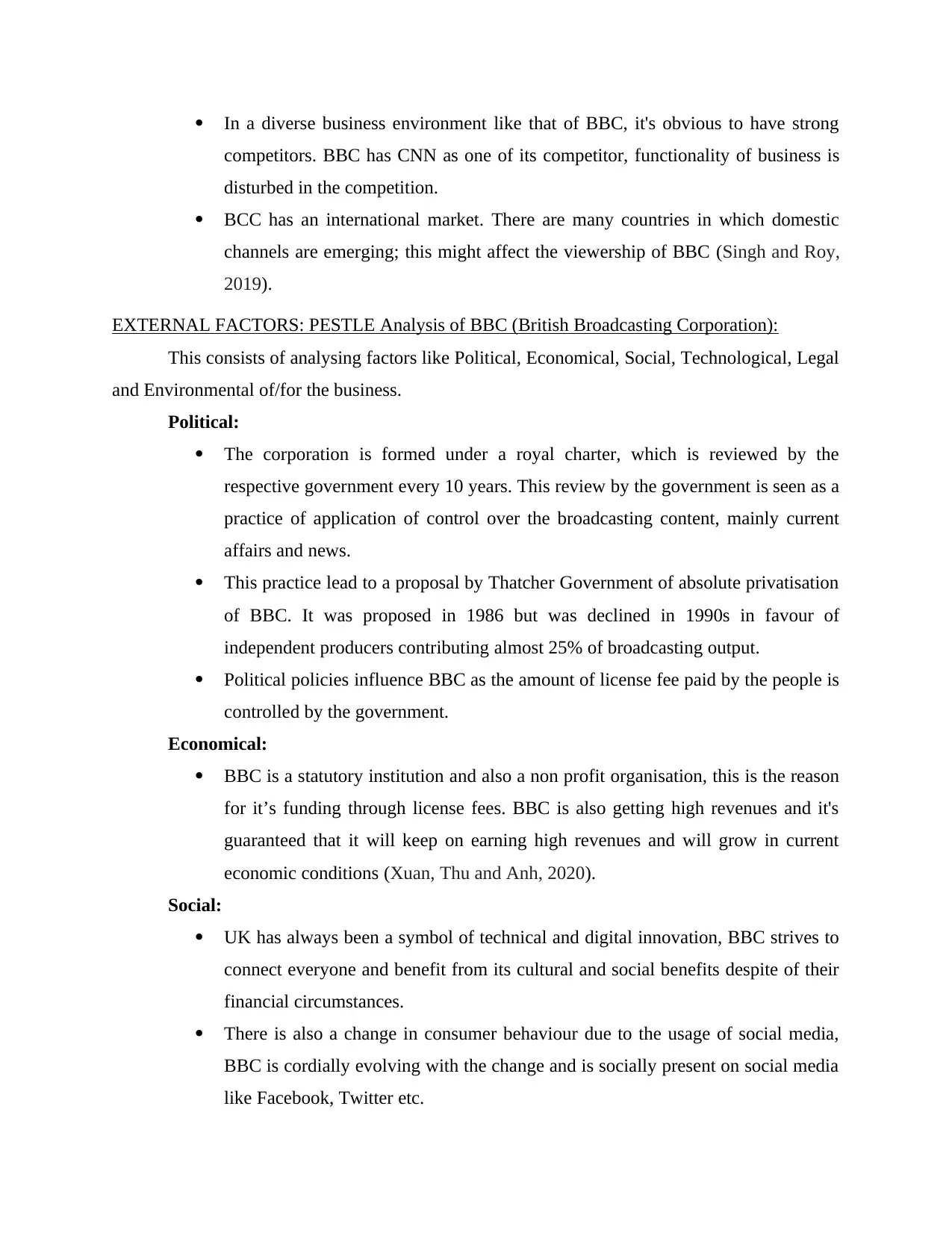
In a diverse business environment like that of BBC, it's obvious to have strong
competitors. BBC has CNN as one of its competitor, functionality of business is
disturbed in the competition.
BCC has an international market. There are many countries in which domestic
channels are emerging; this might affect the viewership of BBC (Singh and Roy,
2019).
EXTERNAL FACTORS: PESTLE Analysis of BBC (British Broadcasting Corporation):
This consists of analysing factors like Political, Economical, Social, Technological, Legal
and Environmental of/for the business.
Political:
The corporation is formed under a royal charter, which is reviewed by the
respective government every 10 years. This review by the government is seen as a
practice of application of control over the broadcasting content, mainly current
affairs and news.
This practice lead to a proposal by Thatcher Government of absolute privatisation
of BBC. It was proposed in 1986 but was declined in 1990s in favour of
independent producers contributing almost 25% of broadcasting output.
Political policies influence BBC as the amount of license fee paid by the people is
controlled by the government.
Economical:
BBC is a statutory institution and also a non profit organisation, this is the reason
for it’s funding through license fees. BBC is also getting high revenues and it's
guaranteed that it will keep on earning high revenues and will grow in current
economic conditions (Xuan, Thu and Anh, 2020).
Social:
UK has always been a symbol of technical and digital innovation, BBC strives to
connect everyone and benefit from its cultural and social benefits despite of their
financial circumstances.
There is also a change in consumer behaviour due to the usage of social media,
BBC is cordially evolving with the change and is socially present on social media
like Facebook, Twitter etc.
competitors. BBC has CNN as one of its competitor, functionality of business is
disturbed in the competition.
BCC has an international market. There are many countries in which domestic
channels are emerging; this might affect the viewership of BBC (Singh and Roy,
2019).
EXTERNAL FACTORS: PESTLE Analysis of BBC (British Broadcasting Corporation):
This consists of analysing factors like Political, Economical, Social, Technological, Legal
and Environmental of/for the business.
Political:
The corporation is formed under a royal charter, which is reviewed by the
respective government every 10 years. This review by the government is seen as a
practice of application of control over the broadcasting content, mainly current
affairs and news.
This practice lead to a proposal by Thatcher Government of absolute privatisation
of BBC. It was proposed in 1986 but was declined in 1990s in favour of
independent producers contributing almost 25% of broadcasting output.
Political policies influence BBC as the amount of license fee paid by the people is
controlled by the government.
Economical:
BBC is a statutory institution and also a non profit organisation, this is the reason
for it’s funding through license fees. BBC is also getting high revenues and it's
guaranteed that it will keep on earning high revenues and will grow in current
economic conditions (Xuan, Thu and Anh, 2020).
Social:
UK has always been a symbol of technical and digital innovation, BBC strives to
connect everyone and benefit from its cultural and social benefits despite of their
financial circumstances.
There is also a change in consumer behaviour due to the usage of social media,
BBC is cordially evolving with the change and is socially present on social media
like Facebook, Twitter etc.
⊘ This is a preview!⊘
Do you want full access?
Subscribe today to unlock all pages.

Trusted by 1+ million students worldwide
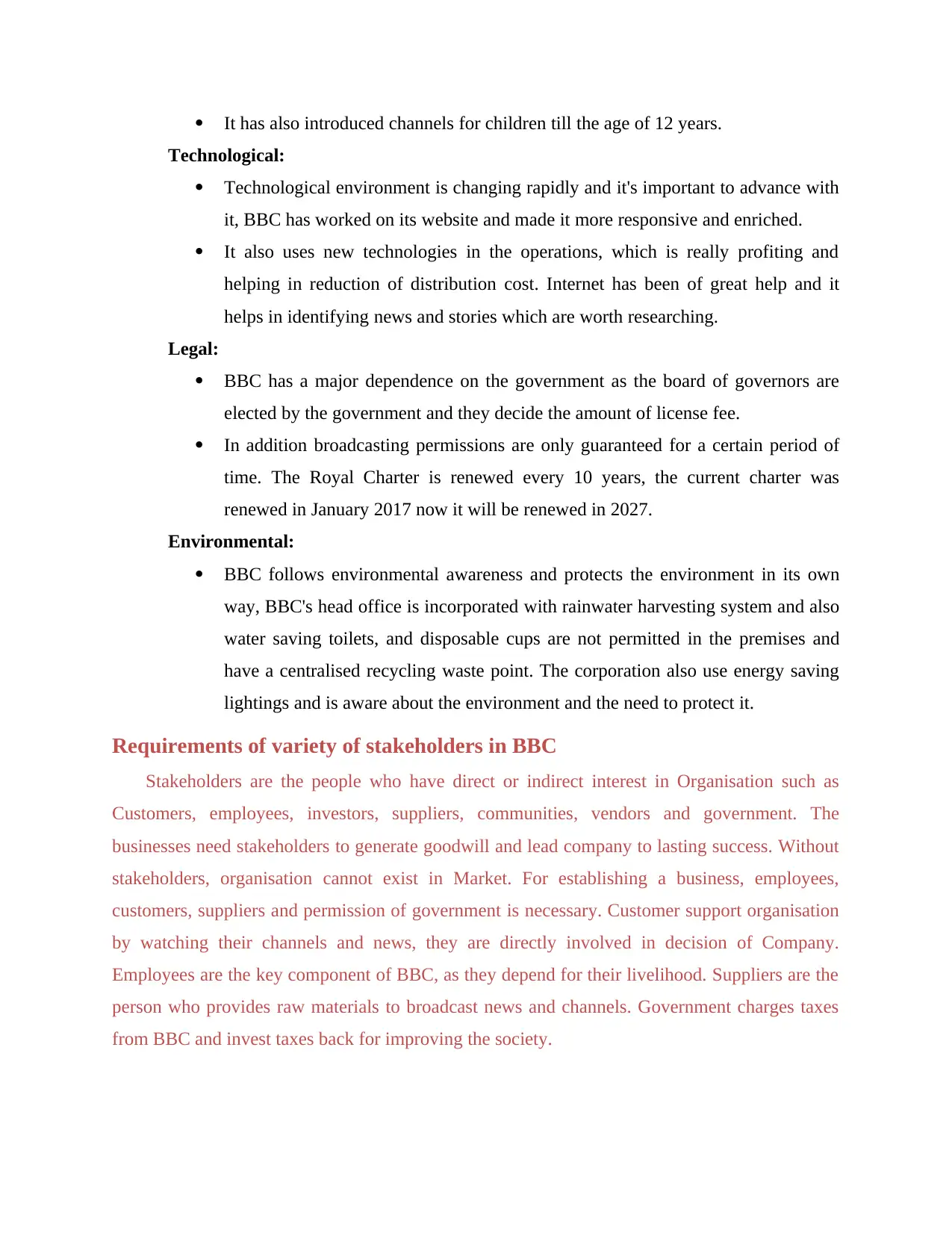
It has also introduced channels for children till the age of 12 years.
Technological:
Technological environment is changing rapidly and it's important to advance with
it, BBC has worked on its website and made it more responsive and enriched.
It also uses new technologies in the operations, which is really profiting and
helping in reduction of distribution cost. Internet has been of great help and it
helps in identifying news and stories which are worth researching.
Legal:
BBC has a major dependence on the government as the board of governors are
elected by the government and they decide the amount of license fee.
In addition broadcasting permissions are only guaranteed for a certain period of
time. The Royal Charter is renewed every 10 years, the current charter was
renewed in January 2017 now it will be renewed in 2027.
Environmental:
BBC follows environmental awareness and protects the environment in its own
way, BBC's head office is incorporated with rainwater harvesting system and also
water saving toilets, and disposable cups are not permitted in the premises and
have a centralised recycling waste point. The corporation also use energy saving
lightings and is aware about the environment and the need to protect it.
Requirements of variety of stakeholders in BBC
Stakeholders are the people who have direct or indirect interest in Organisation such as
Customers, employees, investors, suppliers, communities, vendors and government. The
businesses need stakeholders to generate goodwill and lead company to lasting success. Without
stakeholders, organisation cannot exist in Market. For establishing a business, employees,
customers, suppliers and permission of government is necessary. Customer support organisation
by watching their channels and news, they are directly involved in decision of Company.
Employees are the key component of BBC, as they depend for their livelihood. Suppliers are the
person who provides raw materials to broadcast news and channels. Government charges taxes
from BBC and invest taxes back for improving the society.
Technological:
Technological environment is changing rapidly and it's important to advance with
it, BBC has worked on its website and made it more responsive and enriched.
It also uses new technologies in the operations, which is really profiting and
helping in reduction of distribution cost. Internet has been of great help and it
helps in identifying news and stories which are worth researching.
Legal:
BBC has a major dependence on the government as the board of governors are
elected by the government and they decide the amount of license fee.
In addition broadcasting permissions are only guaranteed for a certain period of
time. The Royal Charter is renewed every 10 years, the current charter was
renewed in January 2017 now it will be renewed in 2027.
Environmental:
BBC follows environmental awareness and protects the environment in its own
way, BBC's head office is incorporated with rainwater harvesting system and also
water saving toilets, and disposable cups are not permitted in the premises and
have a centralised recycling waste point. The corporation also use energy saving
lightings and is aware about the environment and the need to protect it.
Requirements of variety of stakeholders in BBC
Stakeholders are the people who have direct or indirect interest in Organisation such as
Customers, employees, investors, suppliers, communities, vendors and government. The
businesses need stakeholders to generate goodwill and lead company to lasting success. Without
stakeholders, organisation cannot exist in Market. For establishing a business, employees,
customers, suppliers and permission of government is necessary. Customer support organisation
by watching their channels and news, they are directly involved in decision of Company.
Employees are the key component of BBC, as they depend for their livelihood. Suppliers are the
person who provides raw materials to broadcast news and channels. Government charges taxes
from BBC and invest taxes back for improving the society.
Paraphrase This Document
Need a fresh take? Get an instant paraphrase of this document with our AI Paraphraser
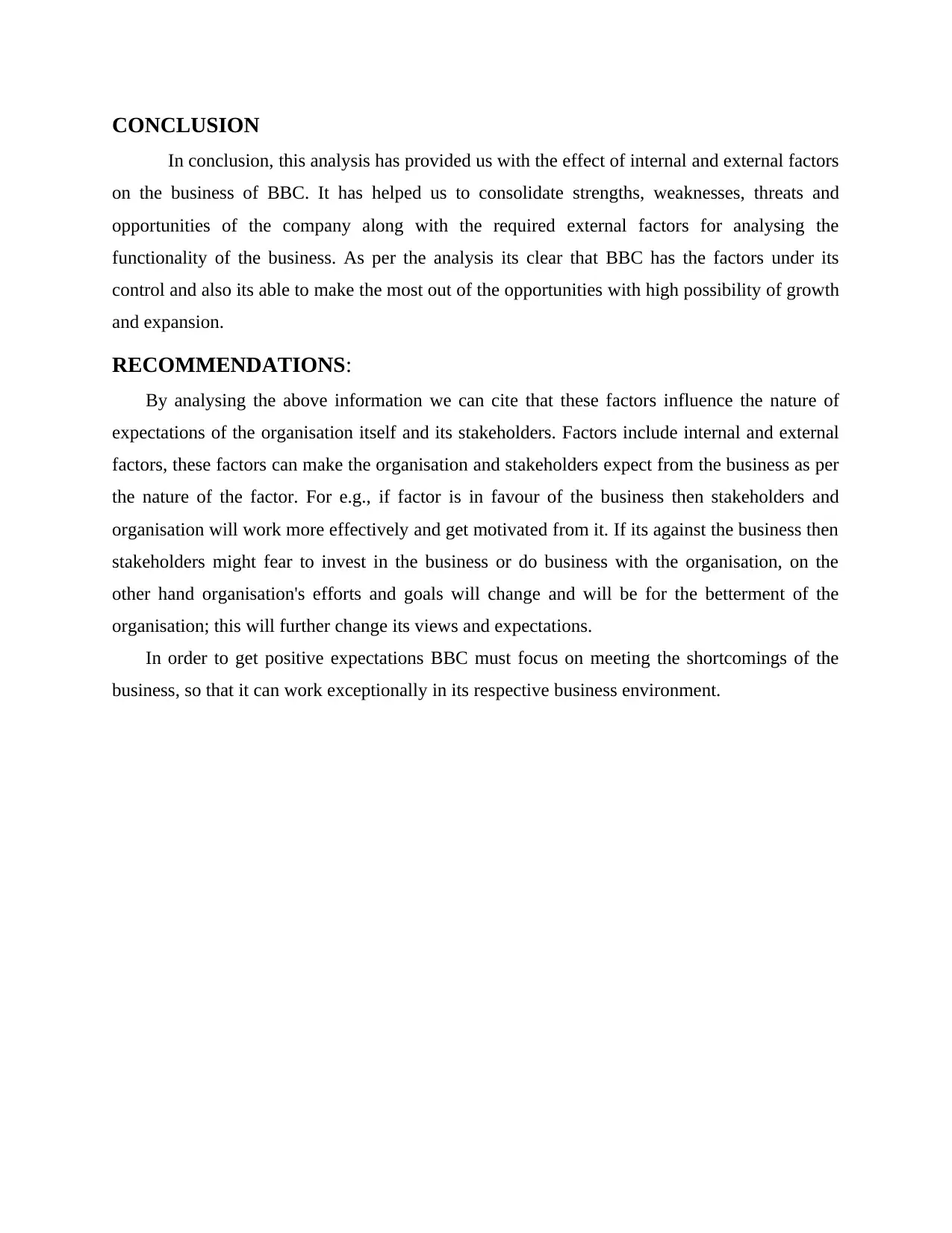
CONCLUSION
In conclusion, this analysis has provided us with the effect of internal and external factors
on the business of BBC. It has helped us to consolidate strengths, weaknesses, threats and
opportunities of the company along with the required external factors for analysing the
functionality of the business. As per the analysis its clear that BBC has the factors under its
control and also its able to make the most out of the opportunities with high possibility of growth
and expansion.
RECOMMENDATIONS:
By analysing the above information we can cite that these factors influence the nature of
expectations of the organisation itself and its stakeholders. Factors include internal and external
factors, these factors can make the organisation and stakeholders expect from the business as per
the nature of the factor. For e.g., if factor is in favour of the business then stakeholders and
organisation will work more effectively and get motivated from it. If its against the business then
stakeholders might fear to invest in the business or do business with the organisation, on the
other hand organisation's efforts and goals will change and will be for the betterment of the
organisation; this will further change its views and expectations.
In order to get positive expectations BBC must focus on meeting the shortcomings of the
business, so that it can work exceptionally in its respective business environment.
In conclusion, this analysis has provided us with the effect of internal and external factors
on the business of BBC. It has helped us to consolidate strengths, weaknesses, threats and
opportunities of the company along with the required external factors for analysing the
functionality of the business. As per the analysis its clear that BBC has the factors under its
control and also its able to make the most out of the opportunities with high possibility of growth
and expansion.
RECOMMENDATIONS:
By analysing the above information we can cite that these factors influence the nature of
expectations of the organisation itself and its stakeholders. Factors include internal and external
factors, these factors can make the organisation and stakeholders expect from the business as per
the nature of the factor. For e.g., if factor is in favour of the business then stakeholders and
organisation will work more effectively and get motivated from it. If its against the business then
stakeholders might fear to invest in the business or do business with the organisation, on the
other hand organisation's efforts and goals will change and will be for the betterment of the
organisation; this will further change its views and expectations.
In order to get positive expectations BBC must focus on meeting the shortcomings of the
business, so that it can work exceptionally in its respective business environment.
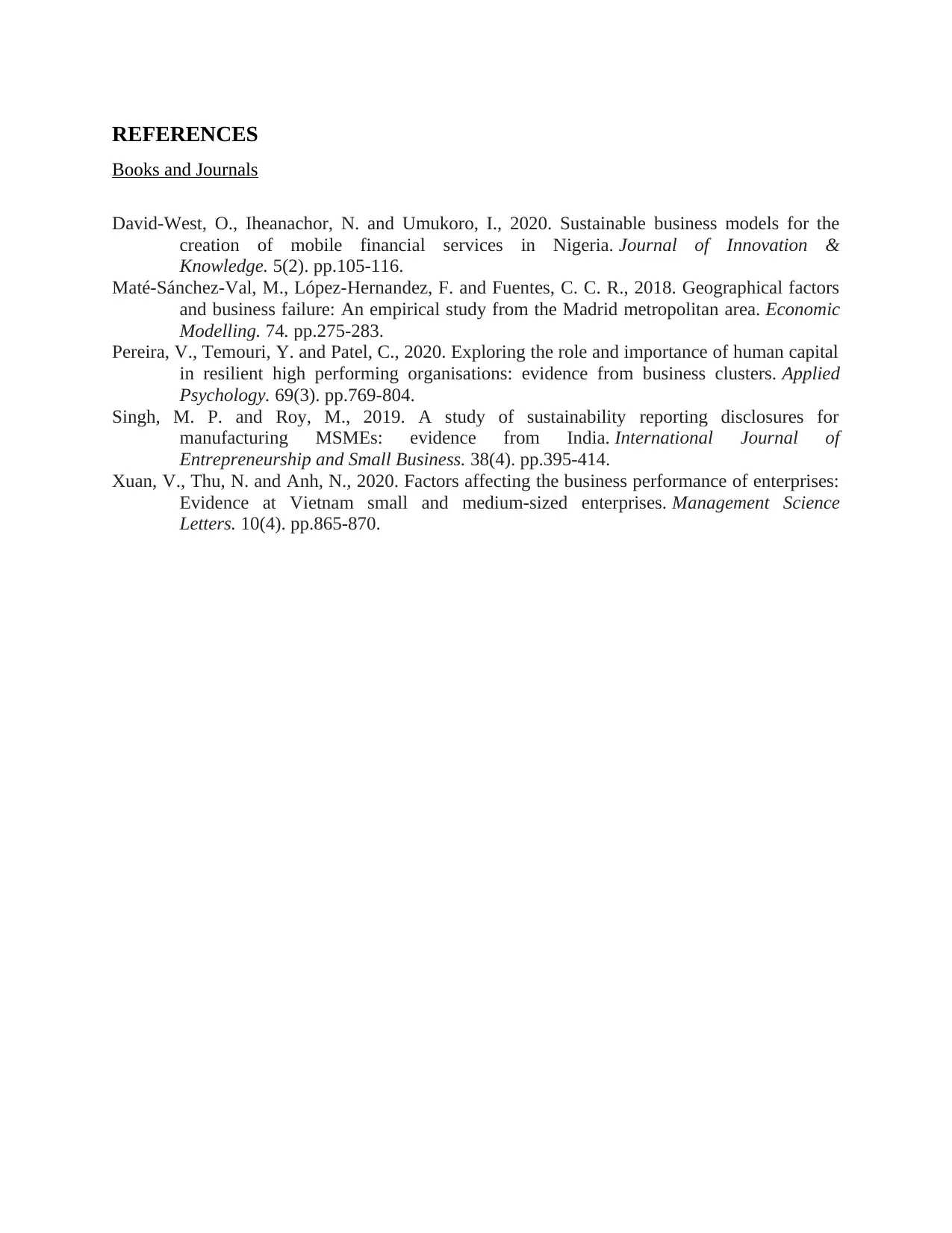
REFERENCES
Books and Journals
David-West, O., Iheanachor, N. and Umukoro, I., 2020. Sustainable business models for the
creation of mobile financial services in Nigeria. Journal of Innovation &
Knowledge. 5(2). pp.105-116.
Maté-Sánchez-Val, M., López-Hernandez, F. and Fuentes, C. C. R., 2018. Geographical factors
and business failure: An empirical study from the Madrid metropolitan area. Economic
Modelling. 74. pp.275-283.
Pereira, V., Temouri, Y. and Patel, C., 2020. Exploring the role and importance of human capital
in resilient high performing organisations: evidence from business clusters. Applied
Psychology. 69(3). pp.769-804.
Singh, M. P. and Roy, M., 2019. A study of sustainability reporting disclosures for
manufacturing MSMEs: evidence from India. International Journal of
Entrepreneurship and Small Business. 38(4). pp.395-414.
Xuan, V., Thu, N. and Anh, N., 2020. Factors affecting the business performance of enterprises:
Evidence at Vietnam small and medium-sized enterprises. Management Science
Letters. 10(4). pp.865-870.
Books and Journals
David-West, O., Iheanachor, N. and Umukoro, I., 2020. Sustainable business models for the
creation of mobile financial services in Nigeria. Journal of Innovation &
Knowledge. 5(2). pp.105-116.
Maté-Sánchez-Val, M., López-Hernandez, F. and Fuentes, C. C. R., 2018. Geographical factors
and business failure: An empirical study from the Madrid metropolitan area. Economic
Modelling. 74. pp.275-283.
Pereira, V., Temouri, Y. and Patel, C., 2020. Exploring the role and importance of human capital
in resilient high performing organisations: evidence from business clusters. Applied
Psychology. 69(3). pp.769-804.
Singh, M. P. and Roy, M., 2019. A study of sustainability reporting disclosures for
manufacturing MSMEs: evidence from India. International Journal of
Entrepreneurship and Small Business. 38(4). pp.395-414.
Xuan, V., Thu, N. and Anh, N., 2020. Factors affecting the business performance of enterprises:
Evidence at Vietnam small and medium-sized enterprises. Management Science
Letters. 10(4). pp.865-870.
⊘ This is a preview!⊘
Do you want full access?
Subscribe today to unlock all pages.

Trusted by 1+ million students worldwide
1 out of 9
Related Documents
Your All-in-One AI-Powered Toolkit for Academic Success.
+13062052269
info@desklib.com
Available 24*7 on WhatsApp / Email
![[object Object]](/_next/static/media/star-bottom.7253800d.svg)
Unlock your academic potential
© 2024 | Zucol Services PVT LTD | All rights reserved.





